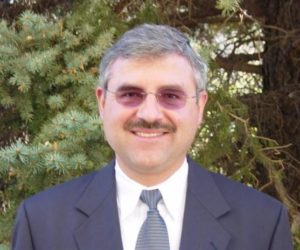2009 Distinguished Lecture Series: David Muñoz
The Mines Humanitarian Engineering Minor Program: Opportunities for Engineering Students Interested in Direct Service to the Underserved
Biography
 Dr. David Muñoz has been a Mines faculty member since fall 1986. During that time he has advised three Ph.D., nine MS and hundreds of undergraduate students in senior design projects. His research areas have had a common theme in energy, primarily related to the thermal-fluid sciences.
Dr. David Muñoz has been a Mines faculty member since fall 1986. During that time he has advised three Ph.D., nine MS and hundreds of undergraduate students in senior design projects. His research areas have had a common theme in energy, primarily related to the thermal-fluid sciences.
The senior design project topics have ranged across a good portion of the engineering realm. He has worked with undergraduates on national design competitions including the Ford Hybrid Electric Vehicle Challenge (a Ford Escort station wagon conversion; 1992-1994), Formula SAE (a ground-up race car design/build; 1996- 2001), SAE Clean Snowmobile Challenge (conversion of a conventional snowmobile to reduce gaseous emissions and noise and compete in Yellowstone National Park; 1999-2001).
Dr. Muñoz spent his first sabbatical with Instituto Tecnologico de Estudios Superiores de Monterrey (ITESM) in Monterrey, Mexico during 1994-1995. At ITESM he worked with the Manufacturing Research Center and taught courses in mechanical design, working with students to design and build a Mexican hybrid electric vehicle. He also taught a graduate-level heat transfer course in Spanish.
In 2001 he advised several teams that delved into advanced guideway alternatives for the I-70 mountain corridor. This project led to a sabbatical (2002-03) serving on a design team funded by the Department of Transportation, Federal Transit Authority to perform a conceptual design for an ITOCHU Japanese magnetically levitated people mover for the I-70 mountain corridor. During this study he analyzed weather data, developed a winterization plan, designed vehicle switching mechanisms, mapped the corridor with GPS and used the data to predict vehicle speed distributions. He also travelled to Japan with a contingent of US advanced transportation engineers to learn about and evaluate transportation alternatives.
Following his second sabbatical, Dr. Muñoz served as interim director to the CSM Engineering Division (2003- 06). In addition to the normal operational duties of that position, he became involved with the humanitarian engineering minor program. Since 2004, Dr. Muñoz has advised six teams of students working on several water projects in Honduras. The first team won the 2004/05 Mondialogo Engineering Award, an international award sponsored by Daimler and UNESCO. He has also been involved with projects in Uganda and Kenya. He is currently initiating projects with the Blackfeet reservation in Browning, MT and with the mining industry in Ghana.
Dr. Muñoz earned a BS from the University of New Mexico and an MS and PhD from Purdue University, all in mechanical engineering. His teaching philosophy is to engage students in whatever subject he is involved. Within the senior design course he seeks educational project experiences that are challenging and memorable for the student, with a focus on global sustainable development.
Abstract
The Humanitarian Engineering (HE) minor at Colorado School of Mines was initiated in 2003 with a generous grant from the William and Flora Hewlett Foundation. Led by Dr. Joan Gosink, Professor Emerita and former Division Director for the Engineering Division, several colleagues from the Engineering and Liberal Arts and International Studies Divisions produced and submitted a proposal in 2002 to form a service learning program for engineering students. The goals of the program were to
- Create a culture of acceptance and value of community and international service activities.
- Increase the number of Mines engineering students who enter internships, and graduates who enter occupations with a community or international service emphasis.
- Increase the recruitment of women and minority students to the engineering program at Mines.
We also wanted to attract a different type of student into engineering; students with an aptitude for science and mathematics, but also having a keen interest in working directly with underserved people.
An early concept for the HE minor was to prepare the students for a life of service through a specially designed set of humanities and social science courses and a technical elective, culminating with an appropriate senior design project. These design experiences have placed hundreds of students in direct contact with underserved people, enhancing the student’s (and the faculty’s) understanding of the challenges associated with communication and combining theory with the messy aspects of reality. We are currently assessing the varied ways in which our graduates have found to realize the possibilities for future involvement in service careers. Challenges remain for providing a smooth transition for our graduates.
As people living within the “developed” world, facing deadlines in our harried schedules, we often lose sight of the human impacts of our actions, let alone the challenges of basic survival faced by one-half of the world’s population. As we learn about the interconnectedness between ourselves, other people in the world, and the biosphere in general, the importance of the basic concepts behind the humanitarian engineering minor become clear. This clarity leads to a refocus on the way in which we live our lives and the way in which we relate to others with whom we share this planet.
